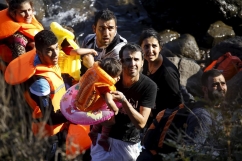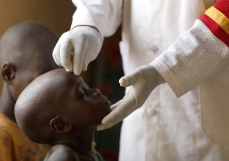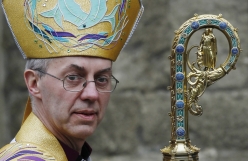Church leaders from the UK and France have visited refugee camps to express their solidarity and support.
A group of bishops from either side of the English Channel took part in a 'Welcome Refugee' day of action in Calais while other UK church leaders have just returned from Idomeni, on the Greek-Macedonian border, where they met some of the thousands fleeing conflict.
The Roman Catholic Archbishop of Southwark and the Anglican Bishop of Dover joined the Bishop of Arras, France as well as 2,000 supporters from England, Ireland, the Netherlands, Germany and other countries at the 'Jungle' camp in Calais.
With winter looming for the camp's inhabitants, the leaders issued a joint statement encouraging people of all faiths to help.
"We repeat our calls for people to respond to the growing crisis by showing generosity to those who are exiled from their homeland," the statement read.
"These vulnerable men, women and children share in our common humanity and everyone can help them to live in dignity and contribute to civil society."
"Its very sad," said the Most Rev Peter Smith, Archbishop of Southwark. "People are living here in very bad conditions."
Jo Siedlecka who took part in the day of action alongside the bishops said she only saw one water source in the camp and eight portaloos.
Writing for ICN (Independent Catholic News), she described how disorganised and ungoverned the place was. Other than a small understaffed centre, "there are no officials structures in place" the limited volunteers "struggle to cope" with the job of sorting and distributing donations.
Anglican priest Rev Tim Clapton was part of the delegation. He told Christian Today that the trip had been very valuable, "The refugees found the Christian delegation a great encouragement. I feel sure for much of the time they are feeling largely marginalised. It was a wonderful opportunity to speak with refugees from across the world as well as hear at first hand the issues faced by those bringing aid."
He said the situation was still very grim, "It is appalling that there is so little basic infrastructure in the camp. So little water, sewage, shelter or food provision. There is an urgent need for major aid agencies to co-ordinate the installation of basic infrastructure before the winter sets in."
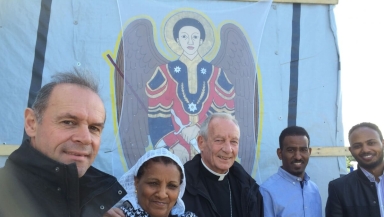
"The British, French and German people have been very kind as van loads of food and clothes roll into the camp each day. There is now no need for more clothing as the warehouses in Calais are full. The challenge is to get those provisions to the camp from the warehouses."
Another group of church leaders from Churches Together in Britain and Ireland (CTBI) returned from Greece on Saturday where they met with refugees, local volunteers and various charities and government officials.
The unofficial border opening at Idomeni has seen up to 4,000 mainly Syrian refugees pass through every day on their way to Serbia and northern Europe.
"We saw the incredible desperation of refugees who were willing to risk journeys in what they themselves called 'death boats' as a means of escape," said Bishop Angaelos, the General Bishop of the Coptic Orthodox Church in the UK.
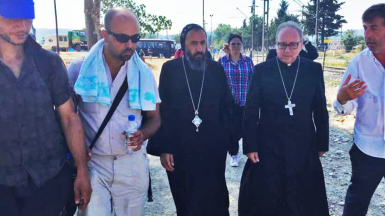
"We stand united with and for those working tirelessly to protect the God-given human rights of these refugees, and those who save the lives of many forced to make this perilous journey.
"As more borders close, refugees who have already sacrificed almost everything will still find alternate routes because they have nothing to lose. In anticipation, we must collaborate to formulate a coherent and humane response."
UNHCR says more than 442,440 people have crossed the Mediterranean this year, and 2,921 have died trying. The International Organization for Migration puts those figures at 473,887 and 2,812, respectively.










